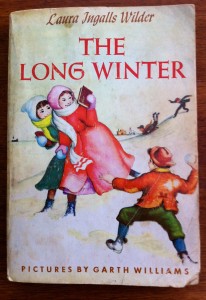Last month, I decided I wanted to read for fun again. NO books on food, not directly anyway, and no books on politics or anthropology or sociology, no biographies and absolutely no Shakespeare either. Just fluffy easy reading. I was at my local library and found myself at the book sale section where they have a little metal box with a slot for money along with a price list for the books on the shelf. I’m a sucker for library book sales. I skipped the heavy subjects and came upon the section for ‘Young Readers’ and came across this
 It was one of the few books of Laura Ingalls Wilder that I had never read. As a kid, I read all of her Little House on the Prairie books. For those of you that aren’t familiar with her work, she wrote a series of books detailing her family’s life as homesteaders during the last part of the nineteenth century. Her family started out in Wisconsin, then Minnesota, Iowa and then eventually settling in the Dakota territories. Laura Ingalls Wilder wrote these books at the urging of her only child, Rose Wilder Lane and they became a classic for many generations. I first discovered these books when I was about 9 years old and I don’t remember which book I first read, but I was hooked. The language is simple and the stories are easy to read but what struck me and still strikes me is the detail that Wilder gives about her life as a girl. Life was so different then- everything Laura and her family had was often something they made with their own hands- the clothes they wore they sewed themselves, they built the house they lived in, they braided the rugs on their floor, they stuffed their mattresses with hay they grew themselves and of course, they made and grew their own food. My favorite parts of the book are when Laura Ingalls Wilder describes the food her mother would make in their tiny poorly equipped kitchen. With only a small wood-burning stove and some staple ingredients, they were able to create simple but substantial meals.
It was one of the few books of Laura Ingalls Wilder that I had never read. As a kid, I read all of her Little House on the Prairie books. For those of you that aren’t familiar with her work, she wrote a series of books detailing her family’s life as homesteaders during the last part of the nineteenth century. Her family started out in Wisconsin, then Minnesota, Iowa and then eventually settling in the Dakota territories. Laura Ingalls Wilder wrote these books at the urging of her only child, Rose Wilder Lane and they became a classic for many generations. I first discovered these books when I was about 9 years old and I don’t remember which book I first read, but I was hooked. The language is simple and the stories are easy to read but what struck me and still strikes me is the detail that Wilder gives about her life as a girl. Life was so different then- everything Laura and her family had was often something they made with their own hands- the clothes they wore they sewed themselves, they built the house they lived in, they braided the rugs on their floor, they stuffed their mattresses with hay they grew themselves and of course, they made and grew their own food. My favorite parts of the book are when Laura Ingalls Wilder describes the food her mother would make in their tiny poorly equipped kitchen. With only a small wood-burning stove and some staple ingredients, they were able to create simple but substantial meals.
This particular book, The Long Winter, detailed how her family survived one of the longest winters in the Dakota territory- starting in October and lasting until May. It snowed so heavily that at one point, their cabin was buried in snow. Their provisions were slim because they came to the territory rather late the previous year and weren’t able to grow enough food for the winter. The trains carrying provisions from back east stopped running because of the extremely heavy snow. The Ingalls family was basically confined to their drafty cabin, living on potatoes from their garden and wheat bread leavened with a sourdough starter and then later with a chunk of dough from the previous day’s bread-baking. The potatoes were dressed with salt. There was no butter or any kind of dairy to be had. The family drank tea. This was it for months and the family suffered from malnourishment, but they survived. It’s a testament to her parents resolve that they were able to endure the hard winter and survive. Despite all the hardships, I admire the life these pioneers lived. They were able to forge a life for themselves, through their own efforts. I envy them a bit, how nice it must feel to know that you can make whatever you need with your own two hands. I know that is why I enjoy cooking so much- I love the feeling of being able to make whatever I want to eat. It’s a craft in which I am proficient. I’ve also come to enjoy gardening. If you’ve been following me on Twitter or Facebook, you’ll see some of my gardening photos, the vegetables and herbs I’ve grown. For years, I’ve made my own breads, pickles, salad dressings and lately, I’ve been making cheese and vinegar too. It can be expensive and time-consuming, but infinitely rewarding.








Leave a reply